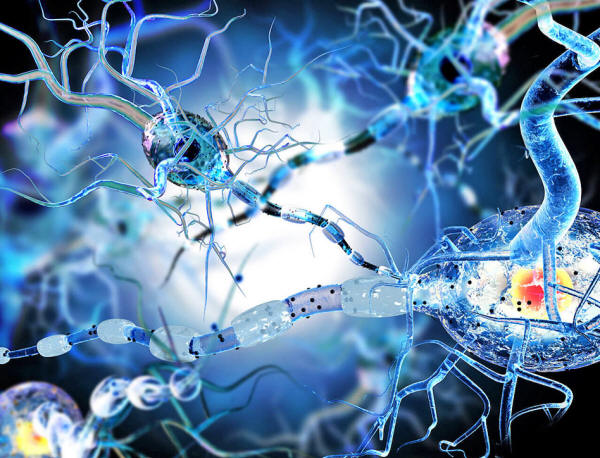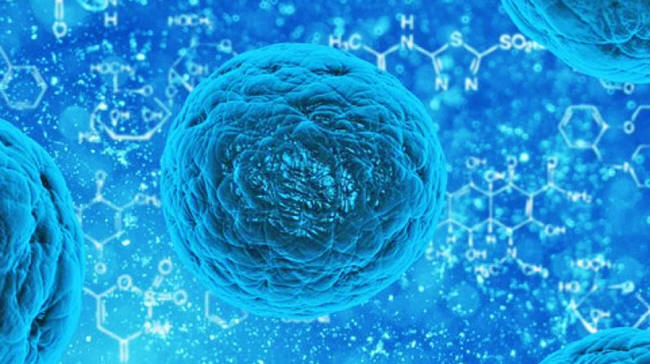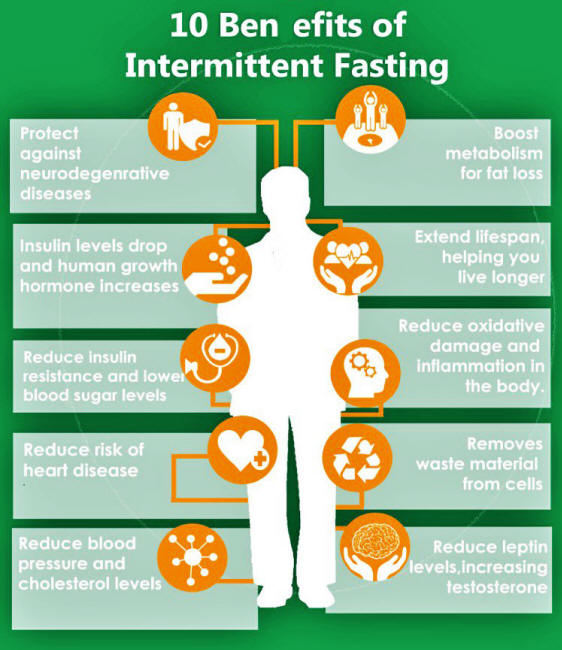|

by Jeffrey Roberts
February 21,
2019
from
Collective-Evolution Website
Spanish
version

In Brief
The Facts:
Autophagy, the body's self-cleaning system, allows
the cell to get rid of old cell machinery, breaking
them down into smaller parts to be reused by the
cell. Activating autophagy through fasting has
neuroprotective and immuno-regenerative benefits.
Reflect On:
Intermittent fasting (IF) is an easy and sustainable
way to activate autophagy as well as reap many other
health benefits. The easiest way to IF is to pick an
eating window that is eight hours or less every day
that works best with your schedule.
The fountain of youth has long been sought by man, science
being the critical avenue in which we've explored this prospect, and
one Nobel Prize-winning scientist recently uncovered a vital piece
in the search.
On October 3rd, 2016, the Nobel Assembly at
Karolinska Institutet awarded the Nobel Prize in Physiology or
Medicine to Yoshinori Ohsumi for his discoveries of
mechanisms for autophagy, a term that translates to "self-eat."
In short,
autophagy is the body's
self-cleaning system, a mechanism in which cells get rid of all
the broken down, old cell machinery (organelles, proteins and cell
membranes). It is a regulated, orderly process to degrade and
recycle cellular components.
The process of autophagy is like replacing parts in a car -
sometimes we need a new engine or battery for the car to function
better.
The same thing happens
within each of our cells. During autophagy, old cellular debris is
sent to specialized compartments within the cell called "lysosomes."
Lysosomes contain
enzymes that degrade the old debris, breaking it down into smaller
components to be reused again by the cell.
Fasting and
Autophagy
Scientists have found that fasting for 12 to 24+ hours triggers
autophagy, which is thought to be one of the reasons that fasting is
associated with longevity.
There is a large body of
research that connects fasting to,
...and Oshumi's findings
provide greater insight into this research.
"Sporadic short-term
fasting, driven by religious and spiritual beliefs, is common to
many cultures and has been practiced for millennia, but
scientific analyses of the consequences of caloric restriction
are more recent… short-term food restriction induces a dramatic
up-regulation of autophagy in cortical and Purkinje neurons.
As noted above,
disruption of autophagy can cause neurodegenerative disease, and
the converse also may hold true:
up-regulation of
autophagy
may have a neuroprotective effect.
Food restriction is a
simple, reliable, inexpensive and harmless alternative to drug
ingestion and, therefore, we propose that short-term food
restriction may represent an attractive alternative to the
prophylaxis and treatment of diseases in which candidate drugs
are currently being sought."
So autophagy and
fasting is in essence a form of self-cleansing, getting rid
of the junk to make room for new healthy cellular components.
And it is the
accumulation of the junk that may be responsible for many of the
effects of aging.
The consequences of accumulating old proteins all
over the place can be seen in two main conditions:
Alzheimer's Disease
involves the accumulation of abnormal protein - either amyloid beta
or Tau protein, which gum up the brain system.
So, if inducing autophagy
cleanses the body of denatured proteins, it would make sense that
the process has the ability to prevent the development of AD.
Other Benefits
of Fasting - Stem Cell Regeneration
While inducing autophagy is one of the key benefits to fasting,
there are also many incredible longevity-related reasons to fast.
A study (Prolonged
Fasting Reduces IGF-1/PKA to Promote Hematopoietic-Stem-Cell-Based
Regeneration and Reverse Immunosuppression) in the journal Cell Stem Cell shows that cycles of
prolonged fasting not only protect against immune system damage but
also induce immune system regeneration, shifting stem cells from a
dormant state to a state of self-renewal.

Fasting triggers regeneration
of immune stem cells.
In a study on mice and a Phase 1 human clinical trial involving
patients receiving chemotherapy, long periods of not eating
significantly lowered white blood cell counts.
In mice, fasting
cycles "flipped a regenerative switch," changing the signaling
pathways for liver stem cells, which are responsible for the
generation of blood and immune systems.
Prolonged fasting forces
the body to use stores of glucose, fat and ketones, but it also
breaks down a significant portion of white blood cells.
During each cycle of fasting, this depletion of white blood cells
induced changes that triggered stem cell-based regeneration of new
immune system cells.
In particular, prolonged
fasting reduced the
enzyme PKA, an effect previously
found to extend longevity in simple organisms, which has been linked
in other research to the regulation of stem cell self-renewal and
pluripotency (the potential for one cell to develop into many
different cell types).
Prolonged fasting also
lowered levels of
IGF-1, a growth-factor hormone
linked to aging, tumor progression, and
cancer risk.
How to Fast
Intermittently and Activate Autophagy
While there are many ways to fast, one of the more sustainable
methods of fasting is intermittent fasting (IF).
"IF" is done cyclically
and for shorter periods of time, so it is much easier to adopt IF
into your weekly schedule as it won't take much out of you compared
to longer periods of fasting.
In fact, practicing IF
will have you more focused and energized throughout your day
compared to when your body is in a constant state of digestion.
The easiest way to IF is to pick an eating window each day and stick
to that window. This can be an eight hour window or less, but
typically you want to keep your eating window under eight hours in
order to reap the most benefits.
An example of an eight
hour eating window could be 11am-7pm, or if you normally eat later
in the day then you could try something like 3pm-10pm.

During your fast you can still drink beverages as long as they
contain no calories such as lemon water, tea, or coffee (without
cream or sugar).
There are incredible
regenerative benefits to dry fasting as well (abstaining from
consuming any food or water); however, dry fasting will push the
body into deeper levels of detoxification and should be approached
more slowly.
Breaking your fast is just as important as the fast itself.
The first meal after a
fast should be easy to digest. Juices, coconut water, and smoothies
are great options as well as watery and astringent fruits such as
grapes, cherries, and oranges.
After that, salads are
the next best option.
After breaking the fast
with raw fruits and vegetables, you can then move on to eating
cooked foods as your digestive system will be activated by then.
Autophagy and fasting are the key to regenerating the body on a
cellular level and, when used strategically and systematically,
these tools hold enormous potential in transforming your health.
| 



